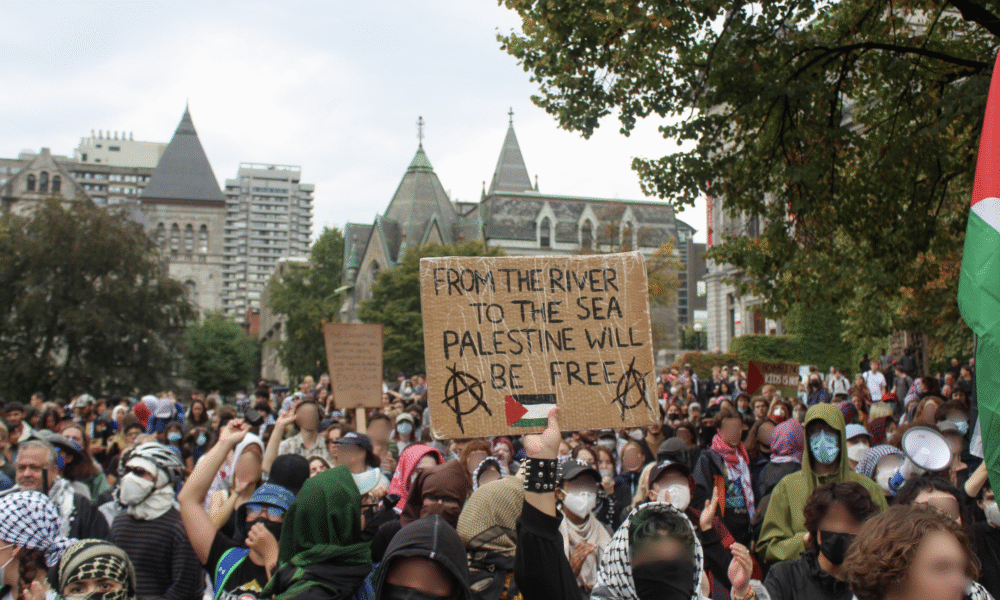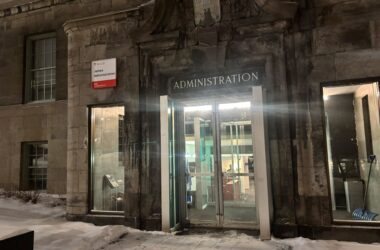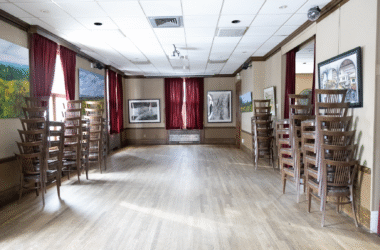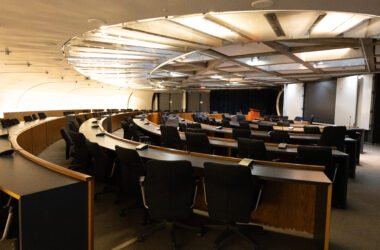A sea of demonstrators in red, white, black, and green chanted, “From the river to the sea, Palestine will be free!” at the Montreal student rally for Palestine on Oct. 7. Commencing outside of Concordia University’s Henry F. Hall Building at 1:00 p.m., thousands of university and CEGEP students and faculty, as well as broader Montreal community members, gathered to protest two years of Israel’s genocide in Gaza. Despite the pouring rain, attendees also showed up to support the day’s Montreal-wide student strikes for academic divestment from the genocide, which applied to over 80,000 students. Chapters of Students for Palestine’s Honour and Resistance across Montreal’s post-secondary institutions organized both the strikes and rally.
Surrounded by Service de police de la Ville de Montréal (SPVM) officers in riot gear—approximately 40 of whom were stationed in lines barricading access to the temporarily-closed Hall Building—attendees cried out chants for Palestine and for divestment. Contingents of students from different universities and CEGEPs, including McGill, Concordia, Cégep de Saint-Laurent, Université de Montréal, and Université du Québec à Montréal, continued arriving to the intersection of rue Mackay and boul. De Maisonneuve Ouest.
Associate Professor of McGill’s Department of Languages, Literatures, and Cultures Daniel Schwartz addressed the growing crowd, affirming that the movement for Palestinian liberation is an ongoing, universal fight.
“A lot of people ask me how I, as a Jew, can make this sort of speech on October 7,” he stated. “And I say to them, as so many of you have said, that this genocide and ethnic cleansing of Palestinians did not start on October 7. I say to them that any day of the year is a good day to commemorate the Palestinian struggle.”
Schwartz continued his speech by applauding the Montreal student collective’s solidarity with Palestine.
“I am proud to stand here with students representing all the universities and CEGEPS in Montreal, [and] to be joined by a growing number of professors […] who refuse to sit on the fence,” Schwartz said. “I’m proud of the moral conscience of our students, of their patience and their steadfastness, despite all the opposition and threats they’ve received from administrators, politicians and the police.”
In an interview with The Tribune, Irene, a member of the Revolutionary Communist Party in Canada, commented on the importance of solidarity between worker and student movements.
“We’re [hoping people] see the connection between what’s happening in Gaza and the broader crisis of capitalism […] to [realize that] oppression in Gaza is tied to oppression here. [….] So we all are vested in freeing Palestine, because it means our freedom too,” they stated. “What’s needed is these students, with their palpable energy, to combine with the workers’ movement, [and] unite together. And this unity [means] we’re unbeatable.”
Around 2:00 p.m., the protest began to travel from rue Mackay onto rue St.-Catherine Ouest. It threaded through nearby streets lined with SPVM officers before moving north on rue Peel. The demonstrators then entered McGill’s campus via a service driveway behind the Bronfman Building, despite the main entrances to campus being closed. At the driveway’s entrance, faculty members held a sign that read, “Profs pour la Palestine.”
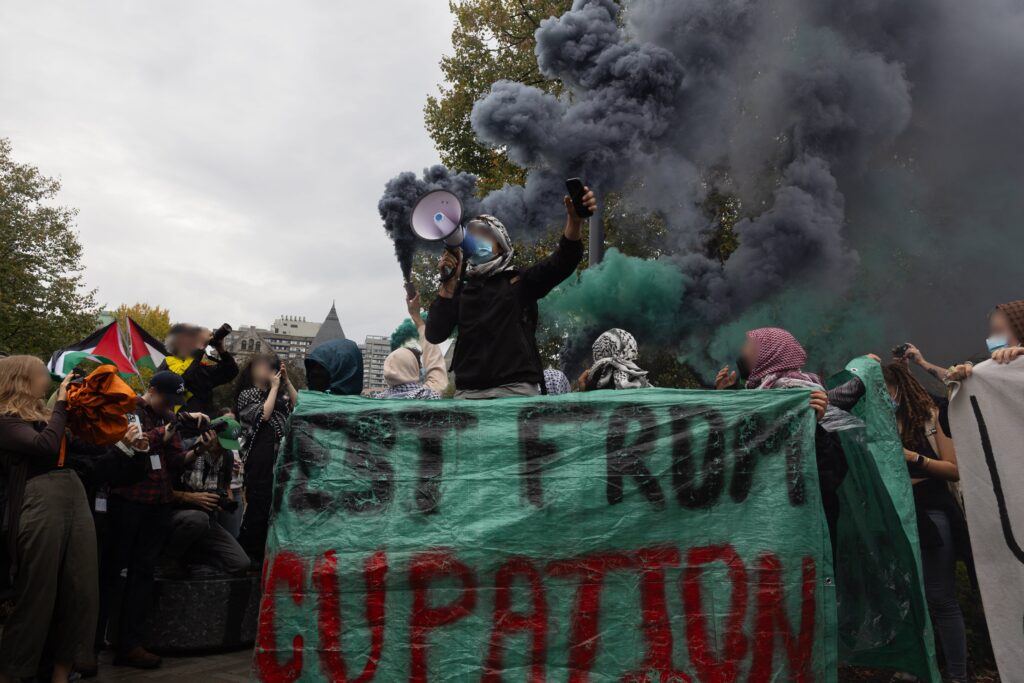
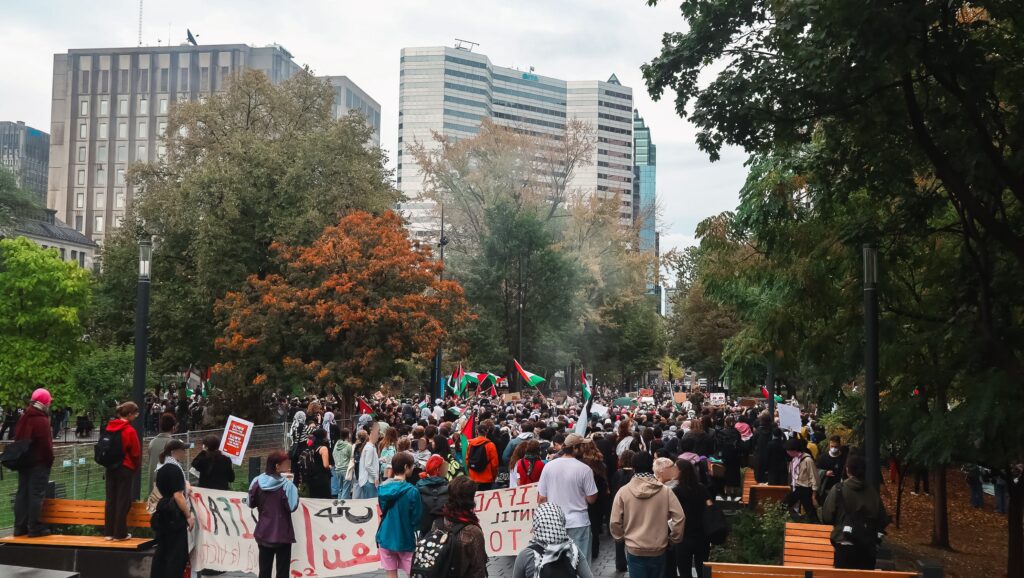
On McGill campus, Associate Professor of the university’s Department of Sociology Barry Eidlin discussed the importance of professors supporting the student movement for divestment in an interview with The Tribune.
“It’s particularly important because the university has taken a really hard line on trying to […] stifle student protest and just campus protests in general,” he stated. “[Professors] get pressure from our administration to just conduct business as usual. [But] the students are here because this is something that they’ve been fighting for, for years now, and it’s fallen on deaf ears.”
The demonstrators moved past the McLennan-Redpath library complex to reach McGill’s Y-intersection, where another protest contingent joined the larger group using the campus road alongside the Macdonald-Harrington Building. As the demonstration unfolded on campus, an individual smashed a window at McLennan-Redpath.
Once the marchers assembled, organizers began releasing smoke bombs and small fireworks in the colours of the Palestinian flag as they unfurled banners to form a protected circle in the centre of the Y. A student speaker in the circle began to detail how academic institutions in Montreal have recently “revealed the lengths that they will go to [to] maintain their genocidal complicity.”
“We have demanded arms embargoes, we have demanded sanctions, and we have demanded divestment, only to be redirected to the so-called diplomatic and civilized channels,” the speaker stated. “And after two years of genocide, we have learned that these channels are anything but diplomatic or civilized.”
Eidlin echoed these sentiments.
“The type of protest often matches the response that protesters received from the powerful, and we have been in a context now where the administration has basically been burying its head in the sand […] [and] the only response [to student demands has been] to lock down campus and try to stifle the ability to engage in free speech and association on campus,” he said.
Amidst chants of “shame” from the assembled crowd, the speaker continued to decry universities’ attempts to “divide [students’] collective might” in pro-Palestinian activist movements.
“Our administrations are motivated by greed and profit amid donor pressure, but do not mistake this self interest for ignorance,” they said. “In their hearts, they know that they’re standing against the tides of history, and history will not wash Deep Saini [and] our [Board of Governors] of their blood-soaked hands.”
In a written statement to The Tribune, McGill’s Media Relations Office (MRO) maintained that the university will not divest.
“McGill remains firmly committed to freedom of expression and peaceful protest,” the MRO wrote.
Organizers at the rally then burned an Israeli flag covered in red handprints, before traveling past the Leacock Building beside the Redpath Museum. “We keep us safe!” the demonstrators chanted, as they approached approximately 20 riot officers preventing access to Leacock. Diverted by the police presence, the collective moved onto rue McTavish, before re-entering the streets of the Golden Square Mile around 3:00 p.m., once more accompanied by police. Onlookers showed support, raising peace signs and honking car horns during stretches of the demonstration that occurred on roads. One attendee was shoved by an SPVM officer as they walked near a Société de transport de Montréal bus.
When the protestors returned to the Hall Building, they were once more met by police officers guarding the doors. Though the group of demonstrators edged close to the doors, there was no escalation, and the protest eventually travelled south from the building to reach Square Victoria, where it joined another demonstration for Palestine at around 4:00 p.m.
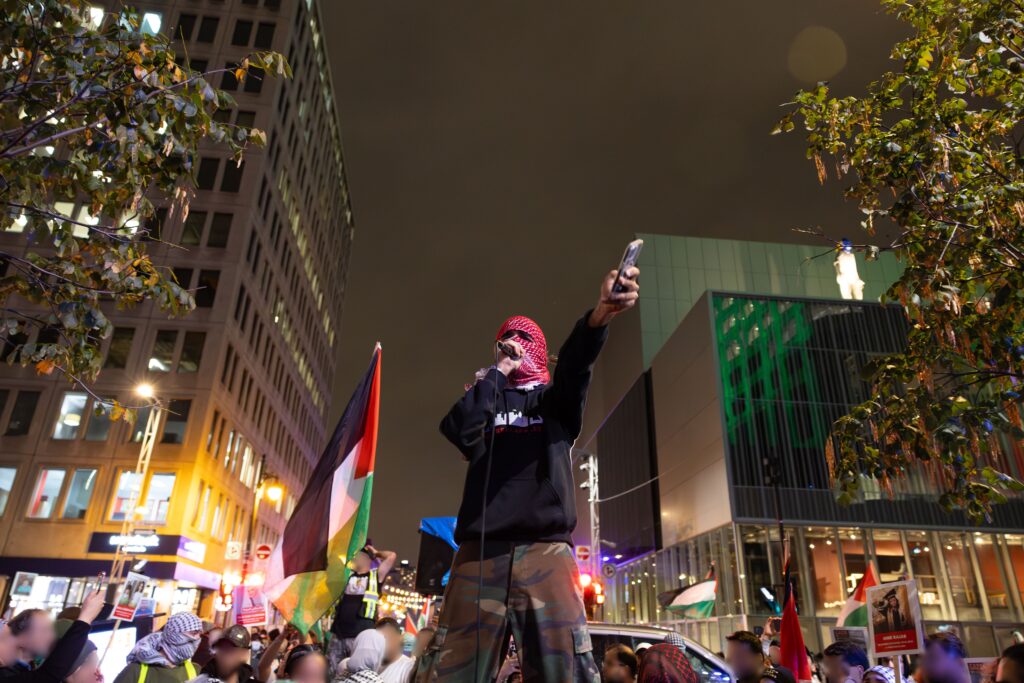
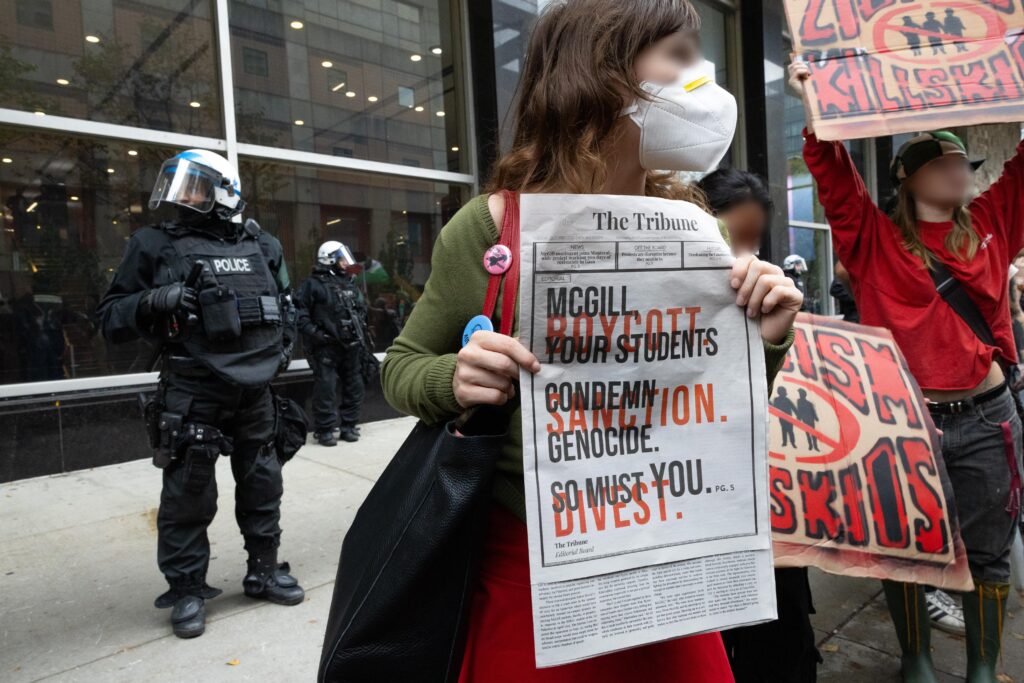
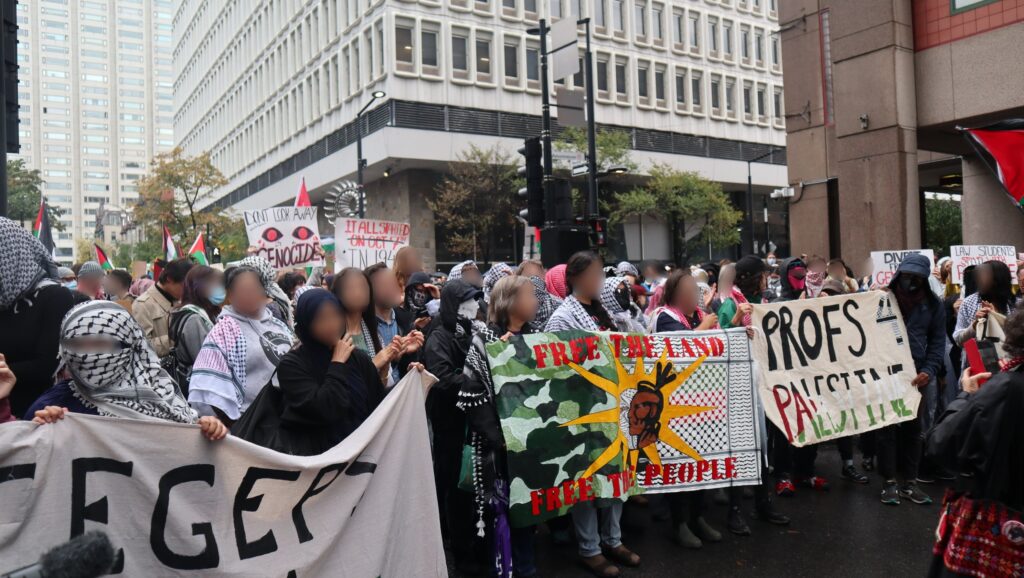
Upon joining the second protest at Square Victoria, demonstrators listened to speeches, including by Mohawk activist and artist Ellen Gabriel, and shared free refreshments provided by organizers. Participants also displayed a mock MK-84 guided bomb, which has been deployed by Israel amidst safe zones in Gaza designated for displaced Palestinians. The demonstration concluded at around 6:30 p.m., with the SPVM reporting no protest-related arrests. Many attendees then moved to Place des Arts to attend a second event for Palestine.
Outside of the Hall Building, Professor at McGill’s Institute of Islamic Studies Michelle Hartman expressed how meaningful inter-university solidarity is in the fight for Palestine in an interview with The Tribune.
“I didn’t recognize one student,” she commented. “Often, when I’m at a protest, I recognize students I’ve taught, and I realized everyone around me [today] was a student from a French university, and that’s the kind of solidarity I think that we need in order to make a difference, and that’s what we’re seeing being created right here, right now.”
Hartman also specifically discussed what the Oct. 7 Montreal student strikes represent, and the importance of faculty support for these student movements.
“We are the majority of the world. We’re the people who are on the right side, and we’re the people who are all over the streets,” Hartman stated. “The students voted for the strike, so professors should respect that, if not stand in total solidarity with the students. [….] I feel like increasing numbers of professors at McGill agree with me. As professors are unionizing across all the faculties now, people are becoming more and more aware of the importance of that kind of solidarity.”
